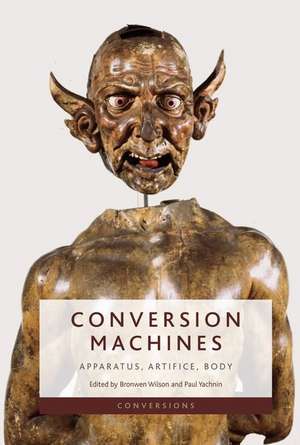Conversion Machines: Conversions
Editat de Bronwen Wilson, Paul Yachninen Limba Engleză Hardback – 12 iun 2023
Preț: 586.82 lei
Preț vechi: 713.69 lei
-18% Nou
Puncte Express: 880
Preț estimativ în valută:
112.32€ • 115.75$ • 94.82£
112.32€ • 115.75$ • 94.82£
Carte disponibilă
Livrare economică 10-24 februarie
Livrare express 25-31 ianuarie pentru 68.53 lei
Preluare comenzi: 021 569.72.76
Specificații
ISBN-13: 9781399516006
ISBN-10: 1399516000
Pagini: 384
Ilustrații: 51 B/W illustrations 29 colour illustrations 51 black & white and 29 colour illustrations
Dimensiuni: 156 x 234 x 22 mm
Greutate: 0.72 kg
Editura: EDINBURGH UNIVERSITY PRESS
Seria Conversions
ISBN-10: 1399516000
Pagini: 384
Ilustrații: 51 B/W illustrations 29 colour illustrations 51 black & white and 29 colour illustrations
Dimensiuni: 156 x 234 x 22 mm
Greutate: 0.72 kg
Editura: EDINBURGH UNIVERSITY PRESS
Seria Conversions
Notă biografică
Bronwen Wilson teaches Art History at UCLA where she is the Edward W. Carter Chair in European Art and the Director of the Center for 17th- and 18th-Century Studies at William Andrews Clark Memorial Library. Her research and teaching explore the artistic and urban cultures of early modern Europe (1300-1700), with a focus on space, print, portraiture, landscape and transcultural, material and environmental interactions. Recent publications include two volumes co-edited with Angela Vanhaelen: Making Worlds: Global Invention in the Early Modern Period (2022) and "Making Worlds: Art, Materiality, and Early Modern Globalization," a special issue of the Journal of Early Modern History (23, nos. 2-3, May 2019), and several articles, such as "Afterword: Ornament and the Fabrication of Early Modern Worlds," in Bodies and Maps: Early Modern Personifications of the Continents, (eds) Louise Arizzoli and Maryanne Horowitz (Brill, 2020); and "Spiritual and Material Conversions: Federico Barocci's Christ and Mary Magdalene," Quid est sacramentum?: On the Visual Representation of Sacred Mysteries in Early Modern Europe, 1500-1700, (eds) Walter Melion, Lee Palmer Wandel, and Elizabeth Pastan (Brill, October 2019). Her current book project, "Otherworldly Natures: Lithic Formations, In-Between Spaces, and Early Modern Italian Art," probes artistic engagement with quarries and riverbeds.
Paul Yachnin is Tomlinson Professor of Shakespeare Studies at McGill University. From 2013-2019, he directed the Early Modern Conversions Project (http: //earlymodernconversions.com/). His ideas about the social life of art were featured on the CBC Radio series, "The Origins of the Modern Public." Among his publications are the books, Stage-Wrights and The Culture of Playgoing in Early Modern England (with Anthony Dawson), co-editions of Richard II and The Tempest, and edited books such as Making Publics in Early Modern Europe (with Bronwen Wilson) and Forms of Association. He leads the TRaCE Transborder Project, which will track the career pathways of PhD graduates from universities in Africa, Australia, Canada, China, England, India, the Netherlands, and the USA, will tell the stories of many graduates, and will undertake to create an international mentoring community. He publishes regularly on graduate education policy and academic culture and on how Shakespeare can speak to the challenges of the 21st century.
Paul Yachnin is Tomlinson Professor of Shakespeare Studies at McGill University. From 2013-2019, he directed the Early Modern Conversions Project (http: //earlymodernconversions.com/). His ideas about the social life of art were featured on the CBC Radio series, "The Origins of the Modern Public." Among his publications are the books, Stage-Wrights and The Culture of Playgoing in Early Modern England (with Anthony Dawson), co-editions of Richard II and The Tempest, and edited books such as Making Publics in Early Modern Europe (with Bronwen Wilson) and Forms of Association. He leads the TRaCE Transborder Project, which will track the career pathways of PhD graduates from universities in Africa, Australia, Canada, China, England, India, the Netherlands, and the USA, will tell the stories of many graduates, and will undertake to create an international mentoring community. He publishes regularly on graduate education policy and academic culture and on how Shakespeare can speak to the challenges of the 21st century.


